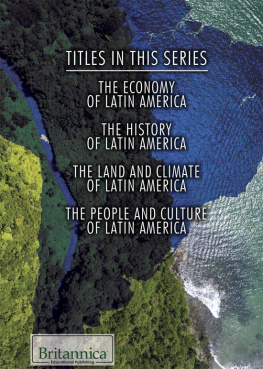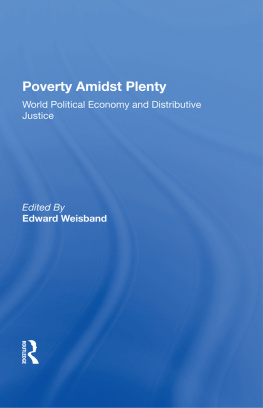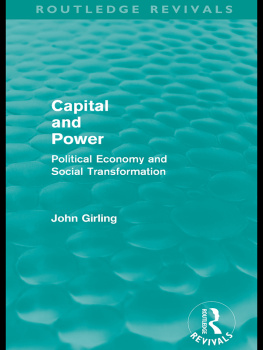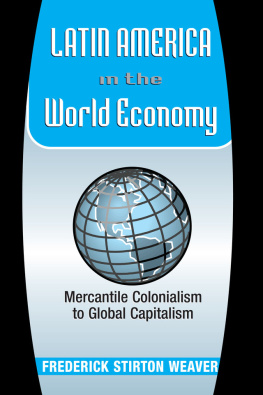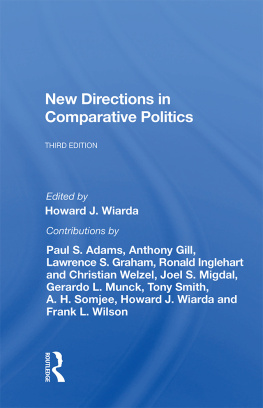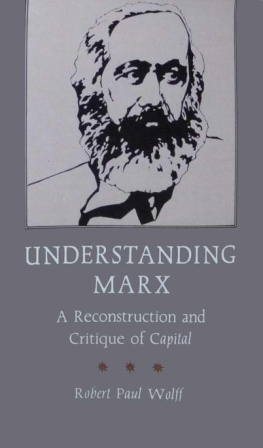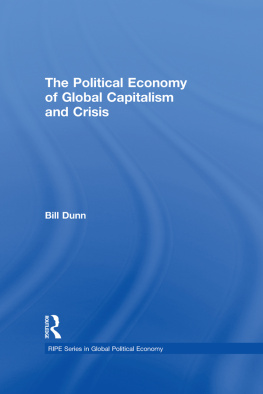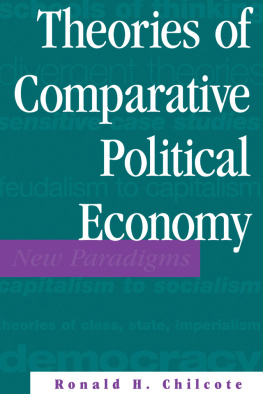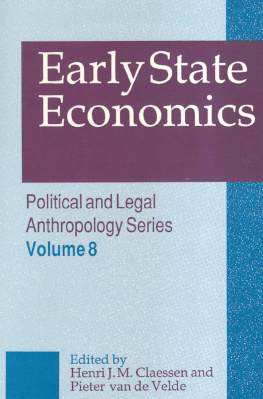First published 1989 by Westview Press
Published 2019 by Routledge
52 Vanderbilt Avenue, New York, NY 10017
2 Park Square, Milton Park, Abingdon, Oxon OX14 4RN
Routledge is an imprint of the Taylor & Francis Group, an informa business
Copyright 1989 by Taylor & Francis
All rights reserved. No part of this book may be reprinted or reproduced or utilised in any form or by any electronic, mechanical, or other means, now known or hereafter invented, including photocopying and recording, or in any information storage or retrieval system, without permission in writing from the publishers.
Notice:
Product or corporate names may be trademarks or registered trademarks, and are used only for identification and explanation without intent to infringe.
Library of Congress Cataloging-in-Publication Data
State, capital, and rural society: anthropological perspectives on
political economy in Mexico and the Andes/edited by Benjamin S.
Orlove, Michael W. Foley, and Thomas F. Love.
p. cm.(Westview special studies on Latin America and the
Caribbean)
Bibliography: p.
Includes index.
ISBN 0-8133-7625-4
1. Agriculture and stateMexicoCase studies. 2. Agriculture
and stateAndes RegionCase studies. 3. MexicoRural conditions
Case studies. 4. Andes RegionRural conditionsCase studies.
I. Orlove, Benjamin S. II. Foley, Michael W. III. Love, Thomas F.
IV. Series.
HD1793.S73 1989
338.1'872dc19 88-39012
CIP
ISBN 13: 978-0-367-28874-7 (hbk)
Anthropology, Capitalism, and the State: Introduction
Benjamin S. Orlove and Michael W. Foley
This volume represents recent anthropological research on the political economy of Latin America. As such, it draws on previous work, from anthropology, from other social sciences and from a larger and less well-defined literature in social and political commentaryand from theoretical efforts that weave in and out of these sources: the dependency debate, the literature on modes of production, and recent attempts to "bring the state back" into social science research and theory. Each of these three bodies of theory has certain autonomous developments, but they also have a great deal in common. Dependency theories, modes of production analysis, and theories of the state all attempt to conceptualize the interrelations among "class," "interest," and, at some level, "power." All three, that is, focus on classical questions of political economy.
The studies presented in this volume both draw on the insights of this literature and challenge the grander theories in important respects, just as the debt crisis and the "redemocratization" of bureaucratic-authoritarian regimes undermined some of the more rigid formulations of dependency theory, the examination of the political economy of capitalism "on the ground" makes clear the degree to which interests and power are rooted not just in class relations abstractly conceived, but in the concrete circumstances of economic exchange, household maintenance, and political struggle. This observation, however, does not negate the importance of the theoretical efforts considered here. Indeed, we can witness in the development of theorizing about the political economy of Latin America a deepening awareness of the complexity of issues that have to be confronted in understanding processes of economic, social, and political change in the region.
The chapters in this volume represent an anthropological contribution to the political economy of Latin America, a bypassing of dependency ). Roseberry develops a usable notion of "mode of production" and a research agenda to exploit its strengths.
Foley and Yambert deal with a literature in many respects more foreign to anthropologists. Much recent theorizing on the state has been carried out by political scientists and Marxist theorists. In the literature on Latin America, it has been carried out in the context of dependency analysis. And overall, theories of the state remain at a high level of abstraction. Nevertheless, as Foley and Yambert show, not only do such theories suggest important avenues of research (on the interaction, especially, between state interests, the exigencies of an international marketplace, and the interests and actions of popular classes), but theories of the state can themselves be enriched by the sort of close analysis to which anthropologists are trained.
The chapters that follow are empirical studies of the political economy of subregions within three Latin American nations: Peru, Bolivia, and Mexico. While all three have in common a large indigenous population and a colonial history of hacienda agriculture and large-scale mineral extraction, they differ markedly in levels of both political and economic development. Whether such national-level differencesattributable in part to the character of the state in each countryare more important than within-country differences is part of the theoretical interest of comparing the cases presented here. Particularly interesting in this regard is the comparison of fisheries development around Lake Titicaca between Bolivia and Peru (Orlove and LeVieil, ). (We examine the possibilities for fruitful comparison in more detail in the concluding chapter.)
But beyond these possible comparisons, the studies that follow carry forward an anthropological critique of global theories, an elaboration of the contradictory possibilities any theory must perforce paper over, and an attempt, however diverse the individual authors' efforts, to flesh out theory and deepen our understanding. These are decidedly attempts to uncover the often contradictory effects of dependency in concrete cases; to examine the loose boundaries between, and the mutable "articulation" of, modes of production; to analyze the mixed success of states in fomenting change and establishing control.
The study by Karl Yambert, for instance, of agrarian reform in Piura, Peru (), explodes more rigid versions of mode of production analysis, demonstrating not only that the larger economy has penetrated deeply and for centuries into the life of even relatively isolated, culturally distinct peoples but that such penetration has differentially distributed opportunities, creating social stratification more reminiscent of full-blown capitalist relations of production than of a "subsistence" economy.
Guillermo de la Pea's study of rural livelihood in the Morelos highlands (governmental policy) in the United States, the dairy farmers of Arequipa face a monopsonistic buyer, wedded to the domestic economy, in the form of a Carnation subsidiary. The ties among peasant producer, village authorities, multinational corporation, and the domestic market are surprising, given the generalizations of dependency theory, but they illustrate the variety both of strategies and of outcomes that multinationals and peasant producers alike may face.
Aaron Zazueta's study of cotton farming in Caborca, Mexico, uncovers other, equally revealing possibilities. There, in a pattern typical of agricultural development schemes throughout the world, the state provided extensive infrastructural backing for agricultural expansion (in the form of tube-well irrigation and a supervised colonization program) while multinational corporations provided both marketing facilities and credit for producers. Although dependency theory correctly calls attention to the deleterious effects of dependence on world commodity markets (in this case, for cotton), it could not predict that the boom and bust cycle in Caborca would owe its force not only to the reliability of Anderson-Clayton's credit facilities but to the eagerness of domestic suppliers to extend credits for inputs and consumption and the unwillingness of farmers to sacrifice consumption standards to the efficiency criteria of their firms. The results were cycles of overexpansion, bad credit risks, and overexploitation of natural resources, deepening incalculably the "busts" in the cycle when, inevitably, commodity prices fell.


